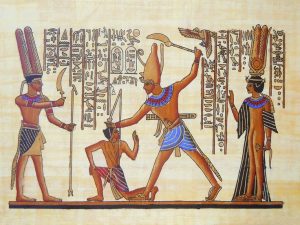There were many laws in Egypt, as there were many Ancient Egyptian Punishments punishments for breaking a law. One of the punishments was one hundred strokes of a cane, and if the crime was worse, five bleeding cuts were added. Other punishments included branding, exile, mutilation, drowning, beheading, and burning alive.
The worst crime was tomb raiding because the treasures in the tomb were sacred. A lot of punishments in ancient Egypt were fatal, such as drowning, beheading, and burning alive. The pharaoh usually decided what would happen to the criminal.
The ancient Egyptians did not leave us a code of law, but they lived in a society where right and wrong were distinguished and acutely felt. The literary texts strive towards harmony in society, but crime existed and punishment was often severe.

Neither riches nor nobility raised a person above the law. High treason committed by powerful noblemen and officials was severely dealt with. Armed with staffs, policemen guarded public places, at times making use of dogs or, probably more rarely, of trained monkeys.
The prevention of crime and apprehension of criminals was the duty of local officials and police forces. They opened investigations following complaints by citizens. During the Old Kingdom, there were seemingly no professional judges. Cases were tried before tribunals of scribes and priests appointed for the purpose, with high officials, sometimes one or even both of the viziers presiding.
Concept of Ma’at
The concept of Ma’at was significant in the legal framework. Ma’at, the goddess of world order represented truth, balance, and justice in the universe. This concept allowed that everyone, with the exception of slaves, should be viewed as equals under the law, regardless of wealth or social position.
Lesser crimes such as personal attack could see a person whipped, be sold into slavery or sent to be a worker in one of the countries building projects or mines. There are instances where guilty have had their hands, noses, tongues, and feet chopped off as a punishment.
Also, the role of Ancient Egyptian Punishments punishment continued after death. After the death of an Egyptian, the living had to prepare him/her for the journey into the afterlife. They mummified the body and provided the deceased with food and other items to sustain him/her.
The Ib (heart) of the individual confessed the good and bad deeds of the deceased to the deities and then was examined by the God Anubis. In the weighing-of-the-heart ceremony, the Ib was then weighed against the feather of truth (Ma’at). If the heart was heavier, it was eaten by Ammit the demon.